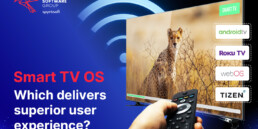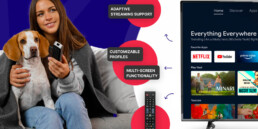The television industry has come a long way – from the early cathode ray tube to the crisp, 8K displays with rich HDR colors and voice assistants built-in. But as this insane evolution happened over almost a century, some things have remained unchanged. The TV set is still a central element of the living room, unvaryingly occupying an important place in modern people’s lives.
The TV screen and a sofa strategically located in front of it form a powerful axis that’s still incredibly relevant and hard to break. Smart TVs combine the features of regular TVs and computers, vastly transcending the capabilities of traditional TVs. With better processors and networking capabilities, modern TVs can now run actual operating systems, access the internet and download apps. This allows users to access external services to meet their growing demands and increase convenience. A whole industry was born around smart TV app development.
In this article, we review the main reasons for considering building a smart TV app today – even if you’re not a video-content company.
Smart TV: an emerging sales channel?
No company will say no to more clients. And if you sell products online, always scratching your head to find new ways to reach customers, why not consider building a smart TV app as an additional sales or advertising channel? Internet browsing on TV is nothing new today, but users are expecting to do more and more things on their SmartTVs. Opportunities are plenty, and shopping may be just an example.
RedBull completely owns the app game, building its market presence and occupying the minds of its target demographics. The RedBull TV app is currently supported on more devices than HBO Go – and Red Bull is not even a major video streaming platform. This is marketing done right. They’ve secured themselves a slot in every major app store, meticulously growing their presence and capturing eyeballs.
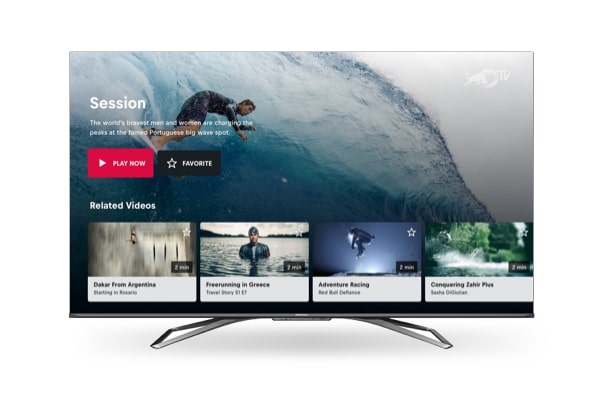
RedBull TV as seen on Android TV
The TV occupies a precious spot at home and is usually associated with entertainment, fun, and relaxation (as opposed to, perhaps, excessive worry and saving money).
For example, offering a shopping app for smart TVs could not only let your customers purchase your products, but also secure you the precious real estate of the smart TV home screen – perhaps alongside those TV apps like Netflix or Prime Video which you open almost every day.
From a marketing point of view, it makes all the sense in the world to utilize yet another channel – especially if you do it before your competitors do. The UX benefits are plenty: the products are bigger, photos show more details and clothes are a tiny bit closer to their real-life dimensions.
It’s not all video streaming!
The statistics presented above show that until recently smart TV apps were mostly a niche dominated by video-driven, entertainment companies. But this is changing now. As we speak, there are whole new categories of Google TV apps emerging: news, sports, education, etc.
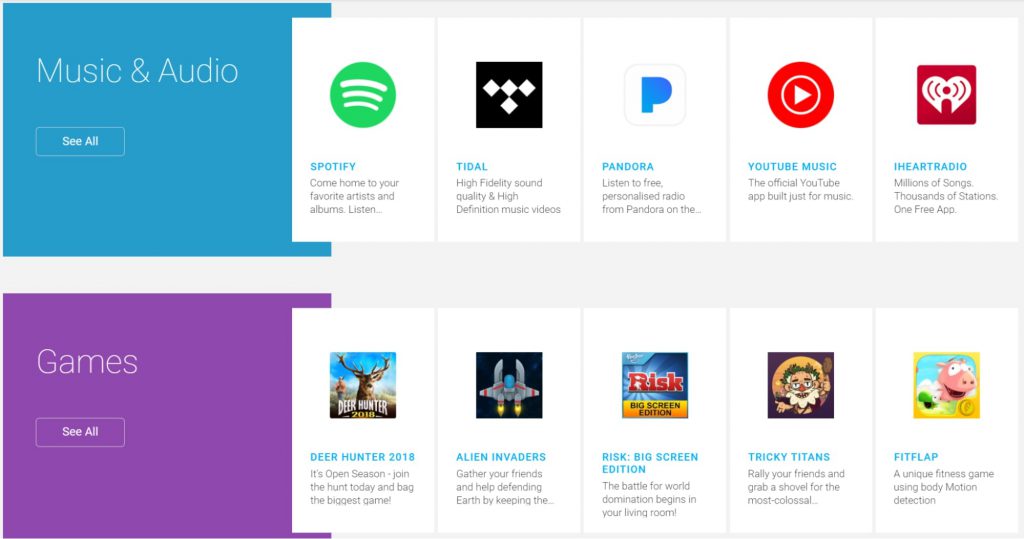
Beyond streaming blockbusters: platforms like Google TV offer many new app categories from podcasts to video games.
The TV screen begs for new, fresh use cases. Just consider the examples below:
- A holiday booking app like Booking.com for the Smart TV would let the family browse hotels and find the best option collectively while sitting on their favorite sofa.
- A recipes/cooking app could display the chilli con carne instructions for you. Kitchen Stories Android TV app is a great example that does just that.
- Education apps – as I’m writing these words, there are just a handful of education apps for kids on Google TV, and most of them are quite bad. It’s hardly encouraging, but shows how much untapped potential lies in the platform.
- Fitness apps – same story.
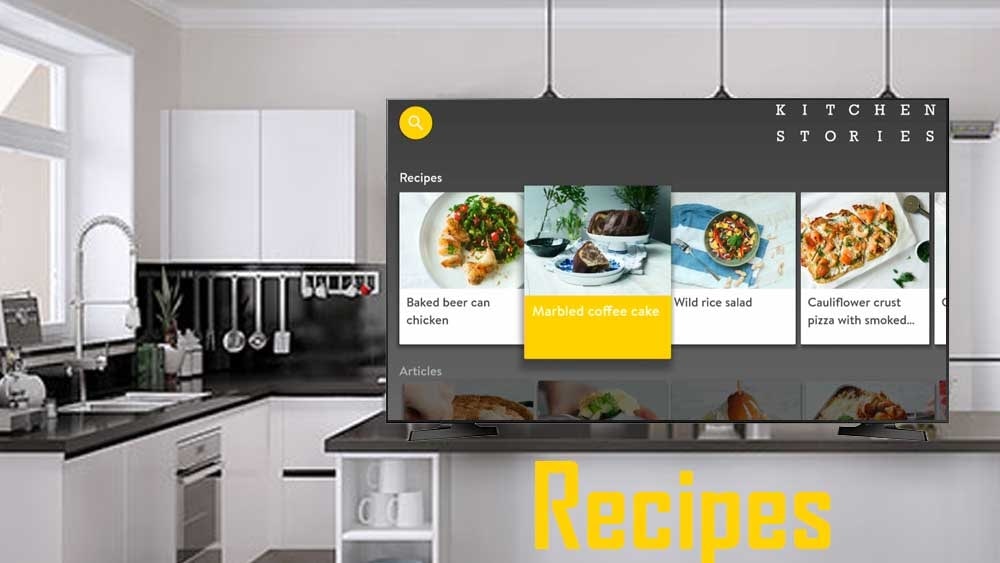
The TV as the internet of things hub
The role of the TV as the central entertainment hub sitting right in front of your sofa is undeniable. But what’s happening now is slowly morphing into a command center controlling your smart home devices scattered around home.
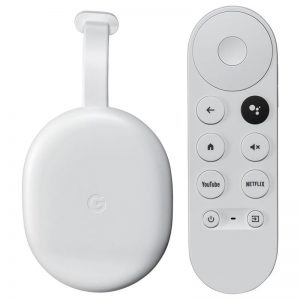
The Chromecast TV remote proudly rocks a dedicated button for Google Assistant
Nothing beats the convenience of saying a command right to the remote and the TV taking care of orchestrating all the lights and speakers.
The benefits of an early adopter
Being an early adopter or, shall we say, developer in the realm of TV apps can translate into a significant edge over the competition. It’s now more important than ever to develop an app and get on the smart TV hype train before Smart TVs become filled to the brim with applications from your potential competitors.
- As per latest Google Play stats, you will be shocked to know that there are 3.48 million apps currently at the Google Play Store.
- The Apple App Store was the second-largest app store with roughly 2.22 million available apps for iOS.
By comparison, the numbers for Smart TV platforms are encouragingly small. As we write these words, there are over 4,500 official Roku channels (this is what Roku calls its “apps”) in total.
A way to escape the third-party ad commissions
As a content publisher or creator it makes all the sense in the world to build your own streaming app and try to escape the commissions of the leading streaming platforms (like, e.g. YouTube). Once you develop and own a Smart TV app and then use it to display ads and monetize your content freely without having to share the revenue with any third party.
Users expect cross-channel experience
Users increasingly demand a seamless experience. No matter what video streaming app you’re using, it’s always a letdown to find it’s not supported on your smart TV. And this doesn’t just apply to media streaming apps.
Microsoft is fully aware of this and has recently updated the OneDrive cloud storage app with the functionality to stream media files (audio, photos, videos) to a Chromecast device or compatible TV. Users expect this kind of seamless, cross-device experience with every app.
![]()
To cast directly from OneDrive, use the Google cast icon in the top toolbar.
(Source: Gadgets360)
Google increasingly supports developer efforts to develop on multiple platforms by lowering the store commissions.
Google halves their commissions
It’s a good time to develop cross-platform apps with Google TV. Google is doubling down on its effort to build a cross-compatible and user-friendly ecosystem. The search giant announced earlier this year that the new Play Media Experience Program will be open to all developers and the company will collect lower commissions from individual app developers. This is a 15% down from the original model (however, this also depends on the sales volume).
The Play Media Experience Program Google program aims to boost cross-platform app development for different Android-based devices, including Android TV, Auto, Watch and bigger diameter devices like tablets.
To qualify for the lower commission, the smart TV application must integrate specific Google platforms and APIs. Among other things, this involves support for Android TV and Google TV and Cast platforms. Similarly, qualifying audio apps must support Wear OS, Android Auto, Android TV and Google Cast platforms.
Conclusion
TV was prematurely proclaimed dead while what really happened was not demise, but evolution. Today’s TVs are hardly what they were two decades ago. And yes, traditional TV programming may be dying, but the TV is alive and kicking, invariably occupying the precious centre stage of every modern family’s living room.
TV and computers have coalesced into an irresistible force that offers plenty of opportunities that haven’t been fully explored. If you’re looking to develop your own Smart TV app or are curious to find out what we can do for you, send us an email. Our experts will be happy to discuss your project.
If you find this article valuable, you can share it on social media →
Read more about the Smart TV applications!
February 20, 2024
What is Titan OS and what do we know about it so far?
Explore what distinguishes Titan OS, a new smart TV operating system. Discover its unique features before giving it a try yourself.
January 30, 2024
Smart TV operating systems: which offers the best user experience?
Discover the best Smart TV operating systems in our expert analysis. Compare top platforms, focusing on user experience.
November 23, 2023
7 Smart TV Features for a Seamless Streaming Experience
Discover emerging opportunities in the Smart TV market. Find out how service providers can leverage enhanced Smart TV features to stay ahead.
Are you looking for a partner to build an application on Smart TV?
Leave your email and a short description about your project. We would gladly discuss different cooperation possibilities!




